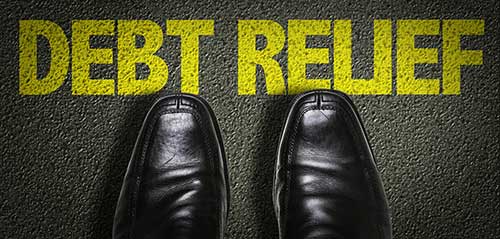
The Top Debt Relief Strategies You Need to Know
Written: Editor | July 13, 2023
:max\_bytes(150000):strip\_icc()/debt-settlement.asp\_Final-e6b6d7d47d8049c1a4852940b13e8b2e.jpg)
Debt Consolidation Options
Debt consolidation loans and how they work
Debt consolidation loans are a popular option for individuals looking to simplify their debt repayment process. With a debt consolidation loan, you can combine multiple high-interest debts into a single loan with a lower interest rate. This allows you to make one monthly payment instead of multiple payments to different creditors. Not only does this streamline your finances, but it may also help you save money on interest payments in the long run.
Balance transfer credit cards as a consolidation option
Another option to consider is balance transfer credit cards. These cards allow you to transfer the balances from your high-interest credit cards to a new card with a lower or zero percent introductory interest rate. This can give you a temporary reprieve from high interest charges, allowing you to focus on paying down your debt more effectively. However, it's important to note that balance transfer fees and the interest rate may increase after the introductory period, so it's essential to carefully review the terms and conditions.
Pros and cons of debt consolidation programs
Debt consolidation programs, also known as debt management plans, are offered by credit counseling agencies. These programs involve negotiating with your creditors to lower interest rates and consolidate your debts into one monthly payment. While debt consolidation programs can be an effective way to regain control of your finances, it's essential to carefully research and choose a reputable credit counseling agency. Additionally, enrolling in a debt consolidation program may have a temporary negative impact on your credit score.
In conclusion, debt consolidation options such as loans, balance transfer credit cards, and debt consolidation programs can help individuals manage their debt more efficiently. However, it's crucial to assess your financial situation and choose the option that aligns with your needs and goals. It's always recommended to seek advice from a financial professional to make an informed decision.
:max\_bytes(150000):strip\_icc()/tactics-for-paying-off-debt-collections-960596-final-dd5c75985b904e46b8d1bd8e0a9f4d77.jpg)
Negotiating with Creditors
Tips for negotiating with creditors for lower interest rates or settlement options
When struggling with debt, negotiating with creditors can be a viable option to reduce financial burden and find a way towards debt relief. Here are some helpful tips to consider:
-
Know your rights: Familiarize yourself with debt negotiation laws and regulations to ensure you are protected throughout the process.
-
Gather all necessary information: Before contacting your creditors, gather all relevant financial statements, account information, and payment history. This will provide a solid foundation for negotiation.
-
Be proactive and honest: Reach out to your creditors before the situation worsens. Explain your financial hardship and propose a feasible plan for repayment or settlement.
-
Offer a reasonable settlement: If you are unable to repay the full amount, propose a settlement amount that you can afford. Creditors might be willing to accept a lower sum to recoup at least a portion of their money.
Importance of understanding debt negotiation laws and regulations
Understanding debt negotiation laws and regulations is crucial to protect your rights and avoid any potential scams. The Fair Debt Collection Practices Act (FDCPA) outlines guidelines that debt collectors must follow when communicating with consumers. Familiarize yourself with these regulations, as they can safeguard you from unfair practices.
When to consider hiring a professional debt negotiator
Sometimes, negotiating with creditors on your own can be challenging and overwhelming. In such cases, it may be beneficial to enlist the help of a professional debt negotiator. They have experience in dealing with creditors, know the laws and regulations, and can provide expert guidance to achieve the best possible outcome.
Remember, debt negotiation is not a one-size-fits-all strategy. Each situation is unique, and it's essential to assess your financial circumstances and explore all available options before deciding on the best approach for debt relief.

Debt Management Plans
Understanding debt management plans and how they can help
Dealing with mounting debt can be overwhelming and stressful. If you find yourself struggling to pay off your debts, a debt management plan (DMP) may be a solution worth considering. A DMP is a program offered by credit counseling agencies that can help you regain control of your finances.
Working with a credit counseling agency to create a personalized plan
When you enroll in a DMP, you will work closely with a credit counseling agency to create a personalized plan tailored to your specific financial situation. The agency will negotiate with your creditors to lower your interest rates, eliminate or reduce late fees, and set up a repayment plan that works for you. Through a DMP, you make one monthly payment to the credit counseling agency, and they distribute the funds to your creditors on your behalf.
Benefits and drawbacks of debt management plans
A DMP offers several benefits. First, it simplifies your debt repayment process by consolidating all your payments into one. It also helps you save money by reducing interest rates and eliminating or reducing fees. Additionally, a DMP provides you with professional guidance and support to help you stay on track with your repayment plan.
However, it's important to consider the drawbacks as well. While a DMP can help you get out of debt, it may negatively impact your credit score in the short term. It also requires discipline and commitment to stick to the repayment plan. Before enrolling in a DMP, it's crucial to carefully evaluate your financial situation and consider alternatives such as budgeting, negotiating with creditors, or exploring other debt relief options.
In conclusion, a debt management plan can be an effective strategy to regain control of your finances and pay off your debts. By working with a credit counseling agency and following a personalized plan, you can take steps towards a debt-free future.

Bankruptcy as a Last Resort
When facing overwhelming debt, it's important to explore all available options to relieve financial burdens. Bankruptcy should be considered as a last resort when other strategies have failed to provide relief.
Exploring the different types of bankruptcy options
Bankruptcy is a legal process designed to help individuals and businesses eliminate or reorganize their debts. There are different types of bankruptcy chapters, including Chapter 7, Chapter 11, and Chapter 13. Each chapter has its own eligibility criteria and consequences.
Consequences and eligibility criteria for filing bankruptcy
Filing for bankruptcy is a serious decision that can have long-lasting consequences. It's important to understand the eligibility criteria and consequences associated with each bankruptcy chapter. For example, Chapter 7 bankruptcy involves liquidating assets to repay debts, while Chapter 13 bankruptcy involves creating a repayment plan.
When to consider bankruptcy as a viable debt relief strategy
Bankruptcy should only be considered when all other options, such as negotiation, debt consolidation, or debt settlement, have been exhausted. It may be a viable option if the individual or business is unable to repay debts and is facing legal actions, such as foreclosure or wage garnishment.
It's important to consult with a qualified bankruptcy attorney to understand the specifics of each bankruptcy chapter and to determine if bankruptcy is the right choice for your unique financial situation.

Alternative Debt Relief Options
When it comes to managing debt, it's important to explore alternative options that can help alleviate the burden. Here are a few debt relief strategies to consider:
Exploring debt settlement services and its potential impact on credit
Debt settlement services involve negotiating with creditors to settle your debt for less than the amount owed. While this option can help you reduce your overall debt, it may come with some consequences for your credit score. It's essential to understand the potential impact on your credit before pursuing this strategy. However, for those facing significant financial hardship, debt settlement could be a viable option to explore.
Considerations for using a debt relief program
Debt relief programs, such as debt management or debt consolidation, offer structured plans to help you repay your debts within a specific timeframe. These programs may involve working with a credit counseling agency to negotiate lower interest rates or consolidate multiple debts into one payment. Before enrolling in a debt relief program, consider factors such as the program's fees, reputation, and how it aligns with your financial goals.
Pros and cons of using a debt repayment plan
A debt repayment plan involves creating a budget and allocating a fixed amount each month to pay off your debts systematically. One advantage of this approach is that it enables you to take control of your finances and become debt-free over time. On the other hand, it requires discipline and commitment to stick to the plan, and it may take longer to pay off your debts compared to other options.
While these alternative debt relief strategies offer potential solutions, it's crucial to assess your unique financial situation and consult with a financial advisor or credit counselor. They can provide personalized guidance and help you choose the best path to regain control of your finances.

Choosing the Right Debt Relief Strategy
Factors to consider when selecting a debt relief strategy
When faced with overwhelming debt, it's essential to carefully assess your options to determine the most suitable debt relief strategy. Here are some key factors to consider:
-
Type and amount of debt: Different approaches may be more effective depending on the type and amount of debt you owe, such as credit card debt, student loans, or medical bills.
-
Financial stability: Evaluate your financial situation to determine if you have a stable income and the ability to repay your debts over time, or if you require more immediate relief.
-
Credit impact: Understand the potential impact on your credit score and credit history, as some debt relief strategies may have more significant consequences than others.
Evaluating your financial situation and goals
Before selecting a debt relief strategy, it's crucial to evaluate your financial situation and set clear goals. Consider the following:
-
Debt-to-income ratio: Calculate your debt-to-income ratio to determine how much of your income is being consumed by debt payments.
-
Monthly budget: Assess your income and expenses to establish a realistic budget that allows for debt repayment.
-
Long-term financial goals: Consider how your debt relief strategy aligns with your long-term financial goals, such as saving for retirement or purchasing a home.
Seeking professional assistance for guidance
Navigating the complex world of debt relief can be overwhelming. Seeking professional assistance from credit counselors, debt settlement companies, or bankruptcy attorneys can provide valuable guidance and expertise.
A debt relief professional can help you understand the pros and cons of various strategies and provide personalized advice based on your unique situation.
Remember, there is no one-size-fits-all solution for debt relief. It's essential to carefully evaluate your options, consider your financial goals, and seek professional guidance to choose the right strategy for you

Conclusion
In conclusion, finding yourself in debt can be overwhelming and stressful, but there are strategies available to help you regain control of your finances. By implementing these top debt relief strategies, you can start working towards a debt-free future.
Final thoughts and recommendations
-
Create a budget and stick to it: Developing a realistic budget is essential for managing your finances effectively. This will help you prioritize your expenses and allocate any extra income towards paying off your debts.
-
Consider debt consolidation: If you have multiple debts with high-interest rates, consolidating them into a single loan with a lower interest rate can make it more manageable. This allows you to focus on one payment instead of juggling multiple creditors.
-
Seek professional help: If your debt situation is overwhelming or you're struggling to make progress, it's a good idea to consult a reputable financial advisor or credit counselor. They can provide personalized advice and assistance in creating a debt repayment plan.
-
Negotiate with creditors: Contacting your creditors and negotiating lower interest rates or more manageable payment terms may help you repay your debts more effectively.
-
Explore debt settlement: Debt settlement involves negotiating with your creditors to pay a lump sum that is less than the total amount owed. This option is typically used as a last resort and may have implications on your credit score.
Remember, tackling debt takes time and discipline. It's important to stay committed to your debt relief strategies and stay focused on your goal of financial freedom. With perseverance and the right strategies, you can overcome your debt and create a healthier financial future for yourself.



